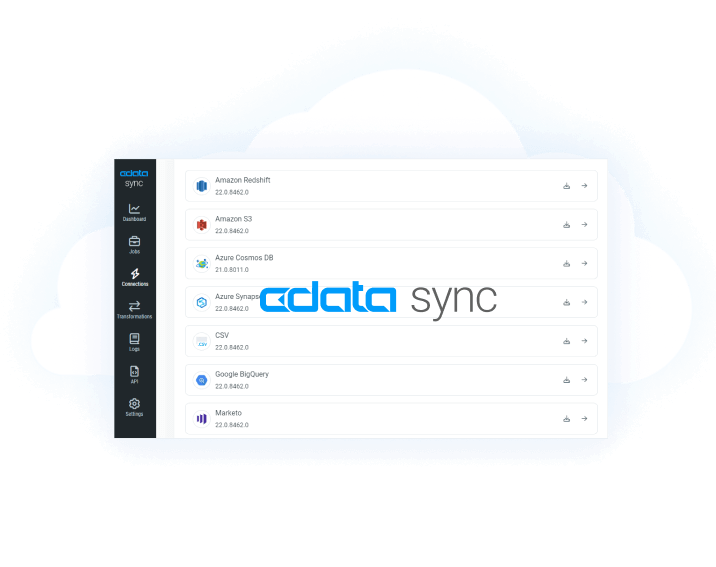Discover how a bimodal integration strategy can address the major data management challenges facing your organization today.
Get the Report →Load JSON Services to a Database Using Embulk
Use CData JDBC drivers with the open source ETL/ELT tool Embulk to load JSON services to a database.
Embulk is an open source bulk data loader. When paired with the CData JDBC Driver for JSON, Embulk easily loads data from JSON to any supported destination. In this article, we explain how to use the CData JDBC Driver for JSON in Embulk to load JSON services to a MySQL dtabase.
With built-in optimized data processing, the CData JDBC Driver offers unmatched performance for interacting with live JSON services. When you issue complex SQL queries to JSON, the driver pushes supported SQL operations, like filters and aggregations, directly to JSON and utilizes the embedded SQL engine to process unsupported operations client-side (often SQL functions and JOIN operations).
Configure a JDBC Connection to JSON Services
Before creating a bulk load job in Embulk, note the installation location for the JAR file for the JDBC Driver (typically C:\Program Files\CData\CData JDBC Driver for JSON\lib).
Embulk supports JDBC connectivity, so you can easily connect to JSON and execute SQL queries. Before creating a bulk load job, create a JDBC URL for authenticating with JSON.
See the Getting Started chapter in the data provider documentation to authenticate to your data source: The data provider models JSON APIs as bidirectional database tables and JSON files as read-only views (local files, files stored on popular cloud services, and FTP servers). The major authentication schemes are supported, including HTTP Basic, Digest, NTLM, OAuth, and FTP. See the Getting Started chapter in the data provider documentation for authentication guides.
After setting the URI and providing any authentication values, set DataModel to more closely match the data representation to the structure of your data.
The DataModel property is the controlling property over how your data is represented into tables and toggles the following basic configurations.
- Document (default): Model a top-level, document view of your JSON data. The data provider returns nested elements as aggregates of data.
- FlattenedDocuments: Implicitly join nested documents and their parents into a single table.
- Relational: Return individual, related tables from hierarchical data. The tables contain a primary key and a foreign key that links to the parent document.
See the Modeling JSON Data chapter for more information on configuring the relational representation. You will also find the sample data used in the following examples. The data includes entries for people, the cars they own, and various maintenance services performed on those cars.
Built-in Connection String Designer
For assistance in constructing the JDBC URL, use the connection string designer built into the JSON JDBC Driver. Either double-click the JAR file or execute the jar file from the command-line.
java -jar cdata.jdbc.json.jar
Fill in the connection properties and copy the connection string to the clipboard.

Below is a typical JDBC connection string for JSON:
jdbc:json:URI=C:/people.json;DataModel=Relational;
Load JSON Services in Embulk
After installing the CData JDBC Driver and creating a JDBC connection string, install the required Embulk plugins.
Install Embulk Input & Output Plugins
- Install the JDBC Input Plugin in Embulk.
https://github.com/embulk/embulk-input-jdbc/tree/master/embulk-input-jdbc - In this article, we use MySQL as the destination database. You can also choose SQL Server, PostgreSQL, or Google BigQuery as the destination using the output Plugins.
https://github.com/embulk/embulk-output-jdbc/tree/master/embulk-output-mysqlembulk gem install embulk-output-mysql
embulk gem install embulk-input-jdbc
With the input and output plugins installed, we are ready to load JSON services into MySQL using Embulk.
Create a Job to Load JSON Services
Start by creating a config file in Embulk, using a name like json-mysql.yml.
- For the input plugin options, use the CData JDBC Driver for JSON, including the path to the driver JAR file, the driver class (e.g. cdata.jdbc.json.JSONDriver), and the JDBC URL from above
- For the output plugin options, use the values and credentials for the MySQL database
Sample Config File (json-mysql.yml)
in:
type: jdbc
driver_path: C:\Program Files\CData[product_name] 20xx\lib\cdata.jdbc.json.jar
driver_class: cdata.jdbc.json.JSONDriver
url: jdbc:json:URI=C:/people.json;DataModel=Relational;
table: "people"
out:
type: mysql
host: localhost
database: DatabaseName
user: UserId
password: UserPassword
table: "people"
mode: insert
After creating the file, run the Embulk job.
embulk run json-mysql.yml
After running the the Embulk job, find the Salesforce data in the MySQL table.
Load Filtered JSON Services
In addition to loading data directly from a table, you can use a custom SQL query to have more granular control of the data loaded. You can also perform increment loads by setting a last updated column in a SQL WHERE clause in the query field.
in:
type: jdbc
driver_path: C:\Program Files\CData[product_name] 20xx\lib\cdata.jdbc.json.jar
driver_class: cdata.jdbc.json.JSONDriver
url: jdbc:json:URI=C:/people.json;DataModel=Relational;
query: "SELECT [ personal.name.first ], [ personal.name.last ] FROM people WHERE [RecordId] = 1"
out:
type: mysql
host: localhost
database: DatabaseName
user: UserId
password: UserPassword
table: "people"
mode: insert
More Information & Free Trial
By using CData JDBC Driver for JSON as a connector, Embulk can integrate JSON services into your data load jobs. And with drivers for more than 200+ other enterprise sources, you can integrate any enterprise SaaS, big data, or NoSQL source as well. Download a 30-day free trial and get started today.






